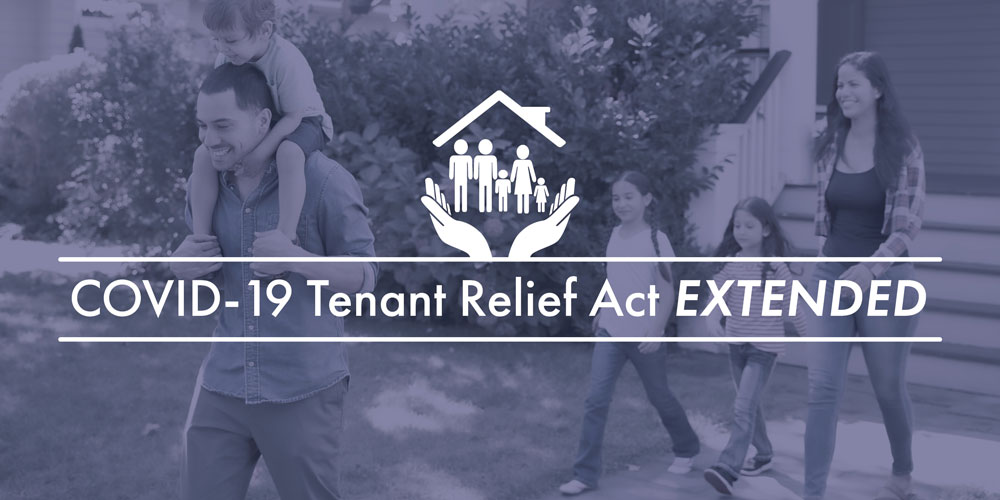

Extends Nation’s Strongest COVID-19 Tenant Eviction Protections Until June 30, 2021
- Extends tenant, landlord, and homeowner protections under AB 3088 (Chiu, Caballero, et.al) until June 30, 2021, including the current requirement that tenants pay 25% per month by the end of the moratorium – June 30, 2021.
- Extends the dates around statewide uniformity/preemption rules until June 30, 2021.
$2.6 billion for Californians to Pay Off Unpaid Rental Debt
- Allocates federal stimulus relief to landlords and tenants through a statewide model.
- Pays up to a year of unpaid arrears (April 2020 through March 2021) and allows up to three months of future rent payments (April 2021 through June 2021), depending on availability of funds.
- Prioritizes, based on federal law, households with highest need, targeting households with less than 80% area median income (AMI) with special focus on households below 50% AMI or households experiencing unemployment for at least 90 days.
Strong Incentives for Landlords and Tenants to Mutually Participate in Obtaining Assistance
- Offers participating landlords 80% of a tenant’s rental arrears as long as the landlord forgives the remaining 20%.
- Offers tenants a 25% payment for landlords who decline to participate in order to secure monthly rental payment eviction protection.
- Preserves 25% prospective rental payments after accounting for unpaid arrears.
- Allows courts to reduce a COVID-19 rental debt damages if a landlord refused to participate in the rental assistance program with a qualified tenant.
Significant Financial COVID-19 Protections for Tenants
- Prohibits a landlord from applying a tenant’s security deposit to satisfy COVID-19 rental debt.
- Prohibits a landlord from charging late fees on the repayment of COVID-19 rental debt.
- Imposes a moratorium on a landlord’s ability to sell or assign COVID-19 rental debt until June 30, 2021.
- Prohibits a landlord from selling or assigning COVID-19 rental debt of a tenant who qualified for the rental assistance program and is below 80% AMI.
Robust Legal COVID-19 Protections for Tenants
- Imposes a moratorium on legal actions seeking to recover COVID-19 rental debt until July 1, 2021.
- Requires a landlord seeking to recover COVID-19 rental debt to provide documentation that the landlord has made a good faith effort to cooperate with a tenant who qualifies for the rental assistance program.
- Allows a court to limit attorney’s fees in COVID-19 rental debt cases.
- Prohibits a housing provider from using COVID-19 rental debt as a negative factor in evaluating a tenant’s rent a unit.
How much federal funding will California receive?
- The federal stimulus bill provided $25 billion nationally and California has been allocated $2.61 billion.
- $1.1 billion direct federal allocation to large cities and counties over 200,000 in population.
- $1.5 billion administered by the state.
- The state share of federal funding ($1.5 billion) will be allocated based on population.
- Provides a $150 million set aside for smaller counties with less than 200,000 in population.
- Remaining funds allocated to large cities and counties with over 200,000 in population.
Who is eligible to receive this assistance?
- Pursuant to federal law, income must be below 80% AMI based on total household income for calendar year 2020 or a household’s monthly income at the time of application.
- Prioritization given to households 1) below 50% AMI or 2) where they have been unemployed for the 90-day period prior to application.
- The statewide model will utilize rounds to prioritize those who need the assistance most:
- Round 1: Below 50% AMI or unemployed for 90 days.
- Round 2: Income below 80% AMI and in a community disproportionately impacted by COVID-19.
- Round 3: Everyone below 80% AMI not addressed in round 1 or 2 above.
What can the assistance be used for?
- Prioritization will be given to rental arreages. Prospective rent and utility arreages can be addressed thereafter.
- Federal law defines utilities to include electricity, gas, water and sewer, trash removal and energy costs, such as fuel oil.
How will funds be distributed?
- The state will administer funds reserved for smaller counties and larger cities and counties that that participate in the statewide program.
- A contracted entity will utilize a technology platform to quickly facilitate funds with landlord and tenant coordination and fraud controls.
- Utilizing local community partners, the contracted entity must have multilingual capabilities and the capacity allow landlords and tenants to track their applications.
- The platform is similar to the model used by the Governor’s Office of Economic Development’s Small Business Grant Program.
- State applications must be available no later than March 15, 2021.
- Local governments with a population over 200,000 that received a direct share of federal dollars and apply for a state block grant can administer their own local program.
How will tenants be notified about this program?
- In addition to educational outreach through local community partners, the bill requires landlords to provide tenants who owe back-rent a notice about the rental assistance program.
How does the application and funding work?
- Federal law authorizes landlords to apply in coordination with a tenant.
- The contracted entity that operates the statewide program will maintain communication between the landlord and the tenant.
- As required by federal law, funds are provided directly to the landlord to be applied to a tenant’s unpaid rent. Upon payment, the program will provide payment documentation to the tenant.
Where can we direct tenants, landlords, or other constituents once this program is up and running?
- Please visit http://housingiskey.com or call the California Housing is Key COVID-19 Assistance Line at 1-833-422-4255 for more information.
Are undocumented individuals eligible for the assistance?
- Yes. Based on conversations we have had with the National Low-Income Housing Project, the rental assistance is available to individuals regardless of citizenship or immigration status. We are waiting for the new federal Administration to issue additional guidance on eligibility.


